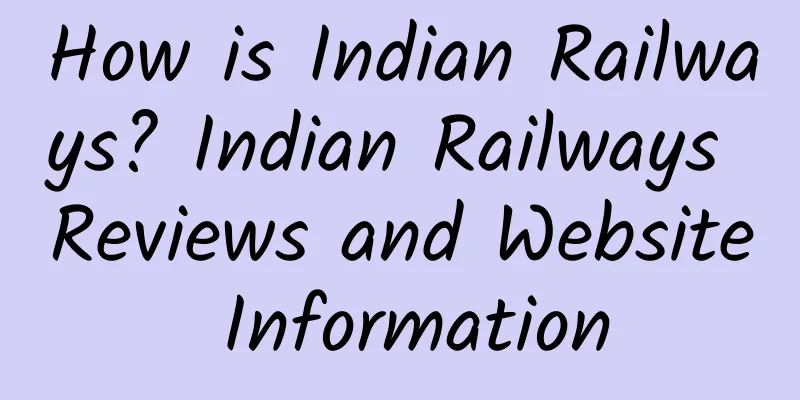How is Indian Railways? Indian Railways Reviews and Website Information

|
What is the Indian Railways website? Indian Railways is a state-owned railway company of India. It was established in 1853 and is headquartered in New Delhi. It manages a total of 115,000 kilometers of railways and is one of the largest railway networks in the world. Indian Railways mainly operates passenger transport, freight transport, travel agencies, parking lots and other businesses. Website: www.indianrailways.gov.in Indian Railways is a state-owned railway company of India, established in 1853. As one of the largest railway networks in the world, it plays a vital role in India's transportation system. Headquartered in New Delhi, Indian Railways manages a railway network with a total length of more than 115,000 kilometers, serving hundreds of millions of passengers and also undertakes a large number of freight tasks. Its official website is www.indianrailways.gov.in , where users can obtain various information about train schedules, fares, reservations, etc. Since its inception, Indian Railways has come a long way. From its earliest steam locomotives to today’s electrified trains, it has not only witnessed technological progress, but also reflected the changes in India’s social and economic structure. The services provided by Indian Railways cover passenger and freight transport, travel agency business, and parking management, making it a comprehensive transportation company. History and MilestonesThe history of Indian Railways dates back to the mid-19th century. On April 16, 1853, the first train ran from Bombay (then known as Bombay) to Thane, marking the official start of the Indian Railway era. The 34-kilometer line was built by the British colonial government and initially served commercial transportation needs, especially the transportation of cotton and other agricultural products to ports for export. Over time, the railway network expanded across the subcontinent, forming a massive system before independence. However, after independence, the private railway companies were consolidated into a single state-owned entity, today's Indian Railways. This shift made railway operations more centralized and efficient, while also helping to promote the country's economic development and social integration. Since the beginning of the 21st century, Indian Railways has made remarkable achievements in modernization and technological upgrading. For example, the introduction of a computerized ticketing system, the development of high-speed train projects, and the improvement of infrastructure quality have greatly improved service levels. In addition, in order to meet environmental challenges, the company has also actively promoted green energy solutions such as solar-powered stations and electric trains. Business scope and service contentAs a comprehensive transportation company, Indian Railways provides a wide range of services, covering almost all railway-related areas. The following is a detailed introduction to these core businesses: Passenger ServicesPassenger transport is one of the most important businesses of Indian Railways, transporting billions of passengers every year. Its train types are rich and varied, including ordinary trains, express trains, luxury trains and international intermodal trains. Different levels of carriages meet the needs of all types of passengers, from economical basic seats to high-end comfortable air-conditioned sleepers. In order to facilitate passengers to buy tickets, Indian Railways has established a comprehensive ticket sales channel, including offline windows, telephone booking and online booking platform. Especially the latter, through its official website or mobile application, users can easily check the train schedule, choose seats and complete the payment process. Freight ServicesIn addition to passenger transport, freight is also an integral part of Indian Railways. With its vast network coverage and strong carrying capacity, the company is able to efficiently transport a variety of goods, from small parcels to bulk minerals. In recent years, with the rise of the e-commerce industry, express logistics has become one of the fastest growing segments in the freight sector. In order to improve efficiency and service quality, Indian Railways has continuously optimized its freight management system. For example, it has introduced barcode scanning technology and real-time tracking functions to ensure that every piece of cargo can be delivered to its destination on time and accurately. At the same time, it has also launched customized solutions to meet the needs of customers in specific industries. Other value-added servicesIn addition to traditional passenger and freight operations, Indian Railways has also entered into a number of related areas to provide more diversified service options:
Technological innovation and development prospectsIn the face of global competition and rapid technological change, Indian Railways is committed to promoting an all-round digital transformation strategy. On the one hand, it continues to strengthen the construction of existing information technology systems, such as improving the functions of the electronic ticketing platform and enhancing the level of network security protection; on the other hand, it actively explores the application potential of emerging technologies, such as artificial intelligence, big data analysis and the Internet of Things. Specifically, in the next few years, Indian Railways plans to implement the following key measures:
In addition, considering the long-term impact of climate change, Indian Railways will pay more attention to the implementation of the concept of sustainable development. For example, increasing investment in clean energy and optimizing line planning to reduce carbon emissions will be included in the agenda. Social Contribution and Cultural SignificanceAs an important link connecting urban and rural areas and across regions, Indian Railways is not only a commercial entity, but also carries profound cultural connotations and social values. For many Indians, taking a train is not only an indispensable part of daily life, but also a unique life experience. Whether it is a lively festival migration scene or a quiet and peaceful short journey in the countryside, every train tells its own story. At the same time, Indian Railways has also created a large number of jobs for local communities and promoted regional economic development. According to statistics, the company directly employs more than one million people and indirectly supports the livelihoods of tens of millions of people. This extensive social influence has made it one of the pillars of India's national economy. ConclusionIn summary, as a state-owned enterprise with a long history and large scale, Indian Railways has played an irreplaceable role in promoting national progress. From the initial simple means of transportation to the present, it has become a comprehensive transportation giant integrating passenger transportation, freight transportation, tourism services and other functions. Looking to the future, with the accelerated pace of technological innovation and the continuous growth of market demand, I believe that Indian Railways will continue to write a brilliant chapter and bring more people a convenient, comfortable and safe travel experience. |
<<: How is Japan Meidensha? Japan Meidensha reviews and website information
Recommend
The efficacy and function of fruit black olive root
The black olive root fruit is very popular. Its b...
What is the Luxembourg Post like? Luxembourg Post reviews and website information
What is the Luxembourg Post? The Luxembourg Post (...
The efficacy and function of hollyhock flowers
Hollyhock is a species of plant in the Malvaceae ...
How to use aloe vera gel How to use aloe vera gel
Everyone is familiar with aloe vera gel. It is th...
The efficacy, effects and usage of essential oil neroli
Orange blossom essential oil refers to the natura...
What are the Minnesota Timberwolves like? Minnesota Timberwolves reviews and website information
What is the Minnesota Timberwolves website? The Mi...
The efficacy and function of wine dates
Wine-soaked dates have a strong wine aroma. They ...
How to eat black beans most nutritiously
Black beans are a kind of bean dish that contains...
What is the Hugo Award? Hugo Award review and website information
What is the Hugo Award? The Hugo Award is a famous...
How is The Nation? Reviews and website information of The Nation
What is The National? The National is a well-known...
How is MUJI? MUJI reviews and website information
What is MUJI? MUJI is the largest daily necessitie...
Planting method of winged stem Dendrobium, precautions for planting winged stem Dendrobium
Dendrobium officinale is a beautiful herb with un...
How is Veolia Environment Group? Veolia Environment Group reviews and website information
What is Veolia Environment Group? Veolia Environme...
The benefits of drinking blood chrysanthemum soaked in water
Blood chrysanthemum is a precious variety of the ...
Where is Crab Stuffed with Oranges a dish from?
Have you ever eaten crab stuffed with orange? Do ...









